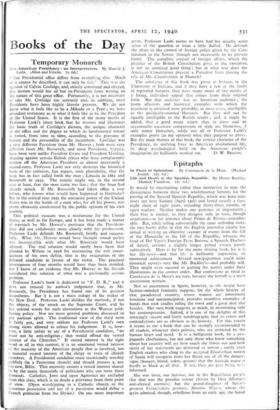Books of the Day
Temporary Monarch
"THE Presidential office differs from everything else. Much of it cannot be described, it can only be felt." This was the opinion of C4vin Coolidge, and, strictly construed and obeyed, this dictum would bar all but ex-Presidents from writing on the nature of this great office. Fortunately, it is not necessary to take Mr. Coolidge too seriously and, in addition, most Presidents have been highly literate persons. We do not know what it feels like to be a Mikado or a Pope ; we have abundant testimony as to what it feels like to be the President of the United States. It is the first of the many merits of Professor Laski's latest book that he stresses and illustrates the basic truth of Coolidge's dictum, the unique character of the office and the degree to which its fundamental nature is varied, from time to time, according to the pressure of history and the personality of the incumbent. Coolidge was a very different President from Mr. Hoover ; both were very different from Mr. Roosevelt, and most Presidents, happily, have been very unlike president Grant and President Harding. Arguing against certain British critics who have complacently written off the American President as almost necessarily a second-rater, Professor Laski not only destroys the historical basis of the criticism, but argues, with plausibility, that the hour has in fact called forth the man ; Lincoln in 1861 and Roosevelt in 1933. The sceptic might say, in the second case at least, that the man came too late ; that the hour had already struck. If Mr. Roosevelt had taken office a year before, who knows what would have happened in Germany? But in the critical year 1932 the executive power of the United States was in the hands of a man who, for all his power, was pretty obviously condemned by the public opinion of his own country.
This political vacuum was a misfortune for the United States, as well as for Europe, and it has been made a matter of reproach by Mr. Hoover's partisans that the President- elect did not collaborate more closely with his predecessor. Professor Laski defends Mr. Roosevelt, briefly and success- fully. What Mr. Hoover would have thought sound policy was incompatible with what Mr. Roosevelt would have advised. The real solution would surely have been that planned by Wilson in 1916 for minimising the evil conse- quences of his own defeat, that is the resignation of the defeated candidate in favour of the victor. The practical interregnum of four months would have thus been avoided, but I know of no evidence that Mr. Hoover or his friends considered this solution of what was a profoundly serious problem.
Professor Laski's book is dedicated to "F. D. R.," and it does not conceal its author's judgement that, in Mr. Roosevelt, the Presidency has found one of its greatest incumbents. But it is not a mere eulogy of the maker of the New Deal. Professor Laski dislikes the methods, if not the objects, of the attack on the Supreme Court, and he has unkind words for such aberrations as the Warren gold- buying policy. Nor are more general problems discussed in any partisan spirit. The traditional view of the third term is fairly put, and very seldom are Professor Laski's own strong views allowed to colour his judgement. It is, how- ever, a little unfair to say of a Presidential candidate, "he must not be anti-religious ; that would offend the vested interest of the Churches." If vested interest is the right word at all in this context, it is an emotional vested interest of the majority of the American people that is involved, not a material vested interest of the clergy or even of church members. A Presidential candidate must occasionally worship publicly (in a Protestant church) and should possess a, not too new, Bible. This necessity creates a vested interest shared in by the many thousands of politicians, who can meet these demands. Catholics, Jews and open Agnostics are excluded from this class, which is no doubt a grievance from their point of view. (Open worshipping in a Catholic church or the notorious .possession and use of a paroissien would debar a French politician from the Elysee.) On one more important point, Professor Laski seems to have had his usually acute sense of the question at issue a little dulled. He defends the share in the control of foreign policy given by the Con- stitution to the Senate (though not necessarily in its present form). The complete control of foreign affairs, which the practice of the British Constitution gives to the executive, is not an unmixed good thing ; but in what way does the American Constitution prevent a President from playing the role of Mr. Chamberlain at Munich?
The substance of this book was given as lectures in the University of Indiana, and if they have a few of the faults of reprinted lectures, they have many more- of the merits of a living, individual appeal that comes from their original form But that audience was an American audience ; the many allusions and historical examples with which the argument is enriched were probably, in most cases, intelligible to the politically-minded Hoosiers. But they will not be equally intelligible to the British reader ; and, it might be added, that a good many minor slips in dates and an occasionally excessive compression of style are blemishes, If only minor blemishes, while not all of Professor Laski's examples prove (in my opinion) what they purport to prove. But the main themes of this book, the central character of the Presidency, its unifying force in American institutional life, its deep psychological ho!d on the American people's imagination are brilliantly worked out. D. W. BROGAN.


































 Previous page
Previous page